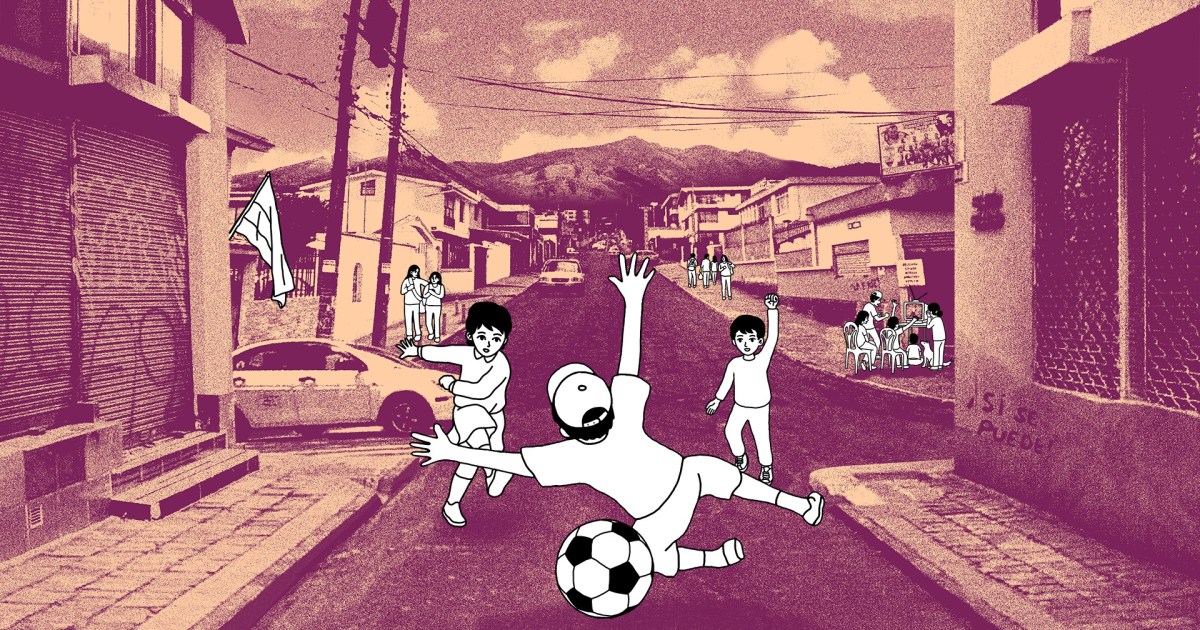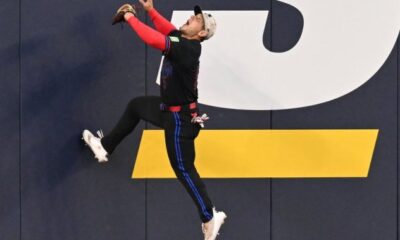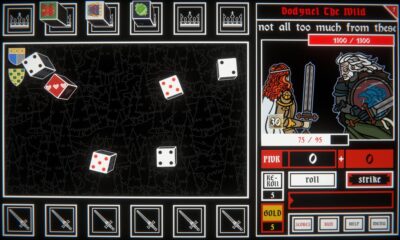Tech News
Despelote review: miraculous slice-of-life soccer game pulls a hat trick

“Despelote is a moving and masterfully rendered game about soccer, growing up, and so much more.”
Pros
- Impeccable ambient sound design
- Audacious visual style
- Exploration of themes not often seen in games
- Can be finished in an evening
Despelote makes me miss home.
If I pull up a Google Maps street view of my old house in the Dominican Republic, I’m met by a stranger. I don’t mean the literal stranger eyeing the camera from the garage, but the place itself. The exterior’s been repainted. The little garden out front has been ripped out. The parking spaces, which were once just aisles of concrete between dirt patches and tufts of grass, have been paved over, and the pathway to the door is no longer. The stoop on which I’d wait for my friends and count ants is gone. Through the barred windows, I see the now vacant sun room where I once spent a summer playing Super Mario 64 on my uncle’s purple Nintendo DS. The sight of my once-home prompts a stinging in my eye.
I’ll never get that time or place back. As if in response to that feeling, Despelote, a game about Quito in Ecuador, a national soccer team, and the people whose lives it impacted, fights so goddamn hard to preserve its own little slice of life. Not just the people of the time, but the content and nature of their intimate and mundane conversations against the sound of dinner being prepared. The doldrums of being stuck in a lecture in your colegio when you just want to be outside kicking a ball with some friends. The texture of the walls of those little houses that line the dilapidated and poorly maintained streets of pueblos. Despelote is a triumph, a work of art concerned with the ephemeral, the importance of a people often denied their personhood, and its own processes to try and deny the passage of time as well as the cruelties of the world.
But first and foremost, it’s about fútbol.
Dreaming bigger
Julián is an eight year old boy in Quito when the Ecuadorian national soccer team’s run at the World Cup, a first for the country, grips the entirety of the nation in 2001. TVs in the windows of storefronts blast the game for passersby. Julián’s parents argue that a relative should simply allow the reception at her wedding to watch one of the games smack in the middle of the momentous personal occasion, unless she wants guests to arrive with their own mobile TV sets or outright show up late. As a result, you spend the entirety of Despelote‘s two hours kicking a realistically simulated ball around town as Ecuador faces economic tumult and steep competition in the World Cup qualifiers.
All the while, Julián plays. Be it a ball, a bottle, or a DVD, he never stops kicking things around and it is always this kinetic and awkward experience. You’re bound to stumble as you attempt to dribble the ball and accurately nail some bottles sitting on a wall or some potted plant. Julián isn’t learned by any means, he’s just a boy with a passion for kicking a ball because he wants to be as big and great as the people he cheers for on TV. And that’s all he needs to be, because despite a lack of technical skill, he has a clear zeal for it.

I spent my childhood summers in the Dominican Republic similarly kicking around a ball that lived in our garage. The girls never made much use out of it, so my grandmother was happy to see it get dusted off two months out of the year. And for those two months, I would wake up, have breakfast, grab the ball and go out into the front yard where I ran makeshift drills. I kicked the ball with as much power and accuracy as I could conjure until I could reliably bounce it off the narrowest sliver of wall. I failed often, but I became reliably proficient at it with time.
My first and biggest dream was to become a world famous soccer player. I think all that time I really just wanted to be beloved and worthy of admiration, and soccer seemed like the vector for that possibility. It was a really solitary thing drilling that ball at the wall and all the time thinking of the stadiums I dreamt of filling, but for Julián, it’s the thing that binds him to everyone in his pueblo, his nation, the player, and to a greater extent, the world. It’s the thing that inevitably gets him into trouble when he’s late arriving home from the park or dirtying an expensive rental suit, but it’s also what most breaks him out of his shell. His life revolves around it and he is eventually signed up for a local youth team, but he also spends days kicking around bottles and balloons, and when he isn’t outside practicing, he’s fulfilling his dreams by leading Ecuador to victory in his video games.
Imagine a picture of your childhood damaged by time and the sun. Now imagine being able to step into it.
In Despelote‘s most dreamlike and surreal moments, Julián kicks a ball around a void that slowly but surely fills with the high rises of the city outside of his little slice of the world. It’s not a bridge out of there — Julián doesn’t dream of leaving Quito or his family and friends behind — it’s the tissue that connects him and them to everyone else, and that World Cup run crystallizes this moment and those people as an extension of himself. Julián doesn’t just dream of soccer, he dreams of connection and community. To him, the words are wholly interchangeable. It’s the feeling that counts.
A fresh perspective
Julián’s world and perspective are especially prominent here because Despelote looks like one of the most stunning things I’ve ever seen. Understandably, a lot of the initial appeal of the game will be the sepia-tone construction of Julián’s neighborhood in Quito and the hand-drawn characters and interactables. Imagine a picture of your childhood damaged by time and the sun. Now imagine being able to step into it. That’s what it feels like to play Despelote, which feels like a masterclass in ambient storytelling techniques.
The school bell (la campana) rings as clearly as if it were installed in my very wall. The giggle of the trio of kids Julián regularly plays with sounds like a microphone was stitched to literal children in a class in my old town. Two visitors gab on Julián’s living room couch while watching a novella, and I swore I was watching my parents spread bochinche (slang for gossip) they had picked up from the day at work. My editor referred to the game as the “first video game mumblecore movie,” a diagnosis better than anything I could possibly come up with but it’s also quite remarkable for it to accomplish this feat in an entirely different language. The beauty of Despelote is that it works; in no time at all, the game’s sights and sounds were so convincing that I began to think in Spanish, which hasn’t felt true since my infancy and early childhood.
I cannot stress how humanizing Despelote is. How cathartic it is for someone like myself to hear Spanish spoken by everyone in my immediate surrounding. To see myself is one thing, but to see my mother in the way that Julián’s own mom holds him by the hand and occasionally reprimands him for being a little pest is beyond words. A vignette of the aforementioned reception lets you awkwardly dance in the corner of the party and kick balloons up at the fan. These stories seem pulled from the unwritten biography of my own life. There really are people out there who get me and the life I’ve led without having ever spoken a word to each other. My experience is shared, I’m not alone.

Moreover, it’s an entirely new kind of story for this medium to tell about these people. I’ve had to make do with morsels in the past that framed characters like me in harsh lights. Whether it was due to tragedy or pure circumstance, we didn’t often survive these stories without some scars to show for it if we made it at all. At a time where tragedy and atrocities against my people could not be more en vogue, Julián’s story is affecting for what it isn’t about. How often will I ever see such vivid recreations of latino boyhood on this scale? Or see the personhood of my neighbors or even the guy that worked the colmado around the corner from my old place? When I stopped going back to my familial home, opting instead to make a life with family and friends here, I forfeited my chance to hold those things tightly again. Despelote clings to them as tightly as possible, and in turn, I’ve affixed myself to it.
In Despelote, Julián is often given a curfew. “Be back by 6:30,” his mom will sometimes tell him. By design, he will never have the time to see and hear everything before being rushed to the next segment of the game. Despite that, I’d urge you to try it though. Stand in the store listening to two of Julián’s neighbors talk about how to prepare a dish and then look back at your watch to see more time than is possible has passed. Idly listen to the head-over-heels teenage lovers in the park, or just take in a show from the local who’s always brandishing his guitar. Days turn to night in the blink of an eye. One moment, I’m eight-year old Julián in the back of his family’s car, and the next I’ve very obviously flashed forward to his teenagedom where he’s getting shitfaced at a party he’s not supposed to be at. Moments bleed into one another as if to say, “Isn’t it all so fleeting?”
When I finished Despelote, and had a good enough cry, I texted my older brother asking if he had a picture of our old place. “Feeling nostalgic?” More than that, big brother.
I finally felt the hole inside of me that being away from home for so long had opened up. Time has flown by and I sometimes feel like a stranger to even myself. Mere days from my 28th birthday, it’s hitting me how distant I am from that wide-eyed pre-pubescent dork whom I love and miss so much. And I think that’s fine, change is a natural part of growing up. But I really hope he’s stopping and taking it all in before it’s passed him by. The welcome cool of those tropical nights. The sound of the waves smacking against the shore mere blocks away. The chalk-like feel of that old home’s walls, and the feeling of his bare feet against the hot asphalt as he kicks a ball at the wall for hours on end. The cheers of a night of youthful revelry and the sensation of barreling down the street with friends and family that will stick with him long after it’s all gone.
Despelote was tested on PC.
-

 Destination9 months ago
Destination9 months agoSingapore Airlines CEO set to join board of Air India, BA News, BA
-

 Breaking News10 months ago
Breaking News10 months agoCroatia to reintroduce compulsory military draft as regional tensions soar
-

 Gadgets4 months ago
Gadgets4 months agoSupernatural Season 16 Revival News, Cast, Plot and Release Date
-

 Tech News1 year ago
Tech News1 year agoBangladeshi police agents accused of selling citizens’ personal information on Telegram
-

 Productivity12 months ago
Productivity12 months agoHow Your Contact Center Can Become A Customer Engagement Center
-

 Gadgets1 month ago
Gadgets1 month agoFallout Season 2 Potential Release Date, Cast, Plot and News
-

 Breaking News10 months ago
Breaking News10 months agoBangladesh crisis: Refaat Ahmed sworn in as Bangladesh’s new chief justice
-

 Toys12 months ago
Toys12 months ago15 of the Best Trike & Tricycles Mums Recommend




















